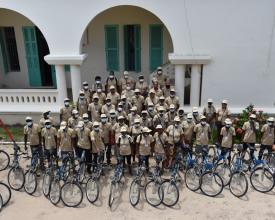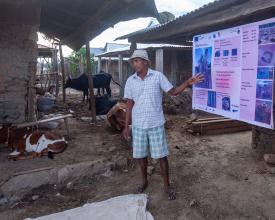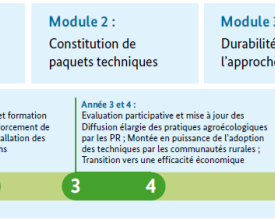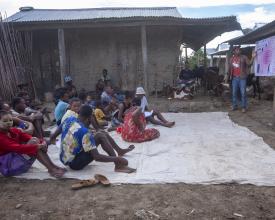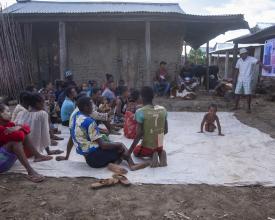
The Paysan-ne Relais (PR) dissemination approach
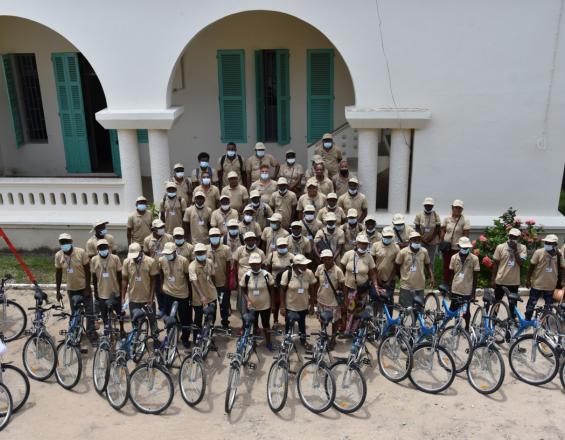
Malagasy agriculture faces many challenges, including soil degradation and food insecurity. The Paysan Relais (PR) approach enables agroecological practices to be disseminated by trained farmers, who pass on their knowledge to their peers. Tested in the Androy and Boeny regions, this approach has demonstrated its effectiveness in facilitating the adoption of sustainable techniques adapted to local realities. By valorizing farmers' knowledge and integrating a national certification system, the PR model strengthens the autonomy of rural communities while ensuring the sustainability of agricultural practices. It promotes access to training, financing and income-generating activities for the farmers involved, while improving the resilience of farming systems.
Context
Challenges addressed
Environmental: Soil degradation, water erosion and rainfall variability threaten agricultural productivity. The adoption of soil conservation techniques is limited by lack of training and access to appropriate resources.
Social: Conventional approaches to agricultural dissemination, often top-down, struggle to find lasting roots in local practices. Lack of institutional recognition of farmers' knowledge hinders its valorization and transmission.
Economic: Limited access to quality inputs and financing restricts the adoption of agroecological practices. In addition, the absence of a regulatory framework for RPs makes it difficult to sustain the model, hindering their role in local development.
Location
Process
Summary of the process
The PR approach is based on three interconnected pillars: (1) the development of a local advisory system, where trained PRs pass on their knowledge to other farmers; (2) the creation of adapted technical packages, enriched by participatory evaluations and regularly updated to meet local needs; and (3) the establishment of a training reference framework and a certification framework, guaranteeing institutional recognition of PRs and their access to funding. The integration of these three elements ensures the effective dissemination of agroecological practices and the sustainability of the PR model, with a direct impact on improving agricultural yields and the resilience of rural communities in the face of climatic and economic challenges.
Building Blocks
Local advisory system
The Paysan-ne Relais (PR) approach is based on a local advisory system that enables the effective transmission of agroecological knowledge within rural communities. This model is characterized by its horizontal dissemination, where PRs, selected on the basis of their commitment and skills, play a key role in training and accompanying their peers in the adoption of sustainable agricultural practices.
PRs are local farmers who apply agroecological techniques on their own plots and act as demonstrators for other farmers. They organize field visits, practical training and exchange workshops, facilitating learning by doing. Unlike conventional agricultural extension methods, which often rely on outside experts, the PR approach enables knowledge to be better appropriated and more finely adapted to local realities.
The process of setting up a PR includes several stages:
- Selection of RPs
- Initial training
- Putting into practice
- Ongoing support
Enabling factors
- Ongoing training, support from NGOs and regional funding boost the effectiveness of RPs. Their social acceptance and proximity to communities facilitate the dissemination and sustainability of agroecological techniques.
- A selection process based on clear criteria such as motivation, social acceptability and agroecological skills helps identify effective relays.
Lesson learned
- Local adaptation of practices is essential. Farmers perceive certain "good practices" as inapplicable. The PR model, rooted in local realities, encourages better adoption of techniques.
- A balance between voluntary work and remuneration is necessary. PRs must be compensated to guarantee their commitment without compromising their economic autonomy.
- Gender specificities must be taken into account. The involvement of "women leaders" makes it possible to adapt the PR model to the constraints of women farmers, ensuring more inclusive dissemination of practices.
Resources
Building technical packages
The technical packages constitute a structured set of agroecological solutions adapted to the specific challenges of the Androy and Boeny regions. They are based on field experience, scientific research and the empirical knowledge of local farmers. Each technical package covers a key area of sustainable agriculture, including :
- Soil management and fertility: soil conservation techniques, crop rotation, use of compost and green manures.
- Erosion control: Installation of hedgerows, fencing, planting of nitrogen-fixing crops.
- Agroforestry: Combining food crops with fruit and forest trees for greater climatic resilience.
- Adaptation to climate change: Selection of local drought-resistant varieties, optimized water management, conservation agriculture.
These technical packages are accompanied by accessible teaching aids (illustrated guides, posters, videos) and are regularly updated through participatory evaluation workshops.
Enabling factors
- The active participation of farmers and the involvement of NGOs in training and monitoring ensure the relevance of the technical packages.
- Regular evaluation workshops and the involvement of state actors promote collective learning and large-scale adoption.
Lesson learned
- Technical packages encourage the adoption of agroecological practices by consolidating local knowledge and accurately identifying the needs of farms.
- Adapting techniques to the local context is essential. Some practices, such as fallowing or sowing under cover, are not suitable for small-scale farmers who cultivate continuously.
- Land constraints must also be taken into account. Techniques requiring permanent investment, such as embocagement, are not viable for farmers without secure land tenure.
- A flexible, differentiated approach is needed. Tools must be adapted to the realities of smallholders, family farms and large-scale producers.
- Participatory evaluation strengthens the effectiveness of interventions. Regular updating of technical packages enables us to better respond to the needs of beneficiaries and improve their impact.
Resources
Sustainability of the PR approach
To guarantee the sustainability of the PR system, it is essential to ensure its institutional recognition and integration into national agricultural policies. This requires the establishment of a national training reference framework and a certification system for PRs. These standards define the skills and learning modules required to train PRs, covering both technical aspects (agroecology, soil conservation) and pedagogical skills (leadership, knowledge transmission). Certification, currently under development, will enable PRs to gain access to funding and strengthen their credibility with agricultural institutions and partners. In parallel, funding mechanisms have been put in place to support PRs and guarantee their empowerment. These mechanisms include :
- The Fonds Régional de Développement Agricole, which subsidizes the services provided by certified PRs.
- Income-Generating Activities (IGAs), enabling PRs to develop agricultural services (seed sales, compost production) to ensure their economic viability.
- Partnerships with farmers' organizations, to integrate PRs into local agricultural support structures.
Enabling factors
- The introduction of a certification process, tested in two pilot areas, guarantees official recognition of the PRs and their integration into agricultural systems.
- The development of Income-Generating Activities (IGAs) enables PRs to offer services linked to local inputs, thereby strengthening their financial autonomy.
- Access to funding mechanisms, notably via the regional agricultural development fund, supports certified PRs by subsidizing their services and initiatives.
Lesson learned
- A national reference system and a certification process reinforce the legitimacy and effectiveness of RPs. These tools offer official recognition and facilitate their inclusion in funding schemes and local partnerships.
- Support for the creation of income-generating activities is crucial to ensure the long-term commitment of PRs. Opportunities such as input supply enable PRs to reconcile their responsibilities with direct financial benefits.
- Collaboration with local actors is essential to maintain the sustainability of the model after the end of the programs. These partnerships ensure a smooth transition and continuity of services.
Impacts
Environmental :
- Increased soil biodiversity and ecosystem services: the application of agroecological practices increases soil biological diversity and creates a breeding ground for ecosystem services.
- Adaptation to climate change: agroecological techniques will improve the resilience of farming systems.
Social :
- Improved agricultural knowledge: RPs transmit adapted agroecological techniques, enhancing farmers' skills.
- Creation of local networks: RPs encourage exchanges and collaboration between farmers at the communal level.
- Support for rural women: the "women leaders" integrated into the model empower women through solutions tailored to their specific needs.
- Institutional sustainability: PR skills will be standardized through a certification process.
- Strengthening institutional networks: collaboration between NGOs, the Ministry and local partners is intensifying.
Economic:
- Improved farm incomes: the sustainable solutions proposed by the PRs will increase farm productivity and profitability.
- Local economic revitalization: the model promotes the creation of employment opportunities and income-generating activities for the RPs.
Beneficiaries
- Rural communities benefit directly from the agroecological practices disseminated by the RPs
- Women farmers: "women leaders" are trained to promote the inclusion of women farmers.
Global Biodiversity Framework (GBF)
Sustainable Development Goals
Story
Augustin is a farmer in the commune of Belalitra, committed to preserving farmland in the face of soil erosion and loss of fertility. Before joining the ProSol program, he observed the degradation of his environment and the growing difficulty of obtaining sufficient harvests.
By becoming a Paysan Relais (PR), he benefited from in-depth training in sustainable land management and agroecology. Thanks to this apprenticeship, he was able not only to improve his own farming practices, but also to pass on his knowledge to other farmers in his community.
"At first, I felt a bit lost, as if I were walking into the unknown. We didn't even know how to develop a nursery," says Augustin. But with the support of the program's technicians, he learned appropriate techniques and began to run local training courses.
One of the highlights was when he taught a group of farmers how to graft fruit trees. Skeptical at first, they gradually gained in confidence as they saw concrete results. Today, these new skills are spreading throughout the community, improving agricultural resilience and family incomes.
Augustin was also able to convince the most reluctant by proposing that they gradually test agroecological practices on a small plot. "Very often, they would come back to me, excited, to share their success stories," he enthuses.
The "Dokany Mora ho an'ny Mpamokatra" initiative has further strengthened this enthusiasm, by facilitating access to training and agricultural inputs. Today, Augustin is in great demand to share his knowledge, and is proud to contribute to the transformation of his territory.
"We're not only improving our lives, but also our environment," he concludes.
